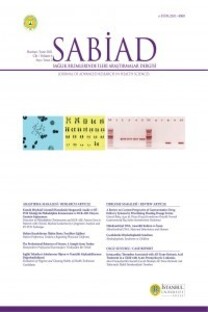DIETARY-BASED MOLECULAR TARGETS AND THERAPEUTIC OPPORTUNITIES IN CANCER
Cancer, Diet, Molecular Targets, Therapy Medicine
DIETARY-BASED MOLECULAR TARGETS AND THERAPEUTIC OPPORTUNITIES IN CANCER
Cancer, Diet, Molecular Targets, Therapy Medicine,
___
- Wellek S, Blettner M. On the proper use of the crossover design in clinical trials: part 18 of a series on evaluation of scientific publications. Dtsch Arztebl Int. 2012;109(15):276-81
- Yayın Aralığı: Yılda 3 Sayı
- Başlangıç: 2018
- Yayıncı: İstanbul Üniversitesi
microRNA AS A PROMISING POTENTIAL BIOMARKER FOR COLORECTAL CANCER
Milad ASADİ, Ayşe CANER, Venus ZAFARİ, Ahmad AL-OMAR, Can MUFTUOGLU, Tuoraj ASVADİ KERMANİ
APPLICATIONS OF TRANSCRIPTOMICS METHODS IN BREAST CANCER
POTENTIAL OF microRNAs AS A BIOMARKER FOR LARYNGEAL CANCER
Milad ASADİ, Ayse CANER, Venus ZAFARİ, Ahmad AL-OMAR, Can MUFTUOGLU, Shahram GHASEMBAGLOU
Can MUFTUOGLU, Ufuk MERT, Emin TAVLAYAN, Milad ASADİ, Özlem ÖZKAYA AKAGÜNDÜZ, Ayşe CANER
miR-3653-3P EXPRESSION IN PERIPHERAL BLOOD OF PATIENTS WITH OVARIAN CARCINOMA
Fatma Seher PEKTOPAL DELEK, Demet AKDENİZ ÖDEMİŞ, Özge ŞÜKRÜOĞLU ERDOĞAN, Seda KILIÇ ERCİYAS, Büşra KURT, Şeref Buğra TUNÇER, Hülya YAZICI
DISSECTION OF T CELL ACTIVATION PHASES FOR CHECK POINT BLOCKADE IMMUNOTHERAPY
CircRNAs OF SALIVA AS POTENTIAL BIOMARKERS FOR COLORECTAL CANCER DIAGNOSIS
Afet SATTAROVA, Milad ASADİ, Tayfun YOLDAŞ, Osman BOZBIYIK, Ahmad AL-OMAR, Can MUFTUOGLU, Ufuk MERT, Ayşe CANER
THERAPEUTIC IMPLICATIONS OF TARGETED SEQUENCING AND miRNA-SEQ OF B CELL LYMPHOMAS
Esra Esmeray SÖNMEZ, Tevfik HATİPOĞLU, Xiaozhou HU, Hongling YUAN, Ayça ERŞEN DANYELİ, Ayla ANAR ARICI, Ahmet ŞEYHANLI, Zühal ÖNDER SİVİŞ, Bengü DEMİRAĞ, Eda ATASEVEN, Dilek İNCE, Zekiye ALTUN, Safiye AKTAŞ, İnci ALACACIOĞLU, Tuğba SÜZEK, Nazan ÖZSAN, Taner Kemal ERDAĞ, Elvan Caglar CİTAK, Sermin ÖZ
Selen KUM ÖZŞENGEZER, Burçin BARAN, Deniz KIZMAZOĞLU, Gamze SANLAV, Safiye AKTAŞ, Tekincan Çağrı AKTAŞ, Zekiye ALTUN, Nur OLGUN
